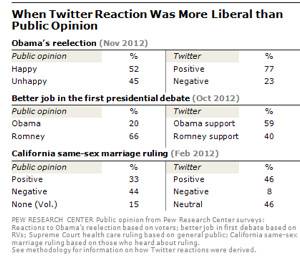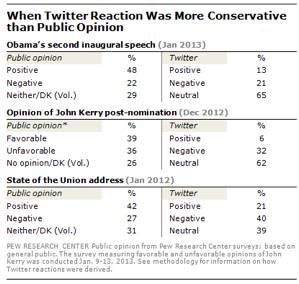
From natural disasters and national tragedies to elections and award shows, no event goes untweeted these days.
For better or worse, we’ve come to consider Twitter an accurate reflection of opinion at large, a global zeitgeist bubbling up through real-time micro-musings. But according to a new report from the Pew Research Center, Twitter might be a sample more than 500 million accounts strong – but that doesn’t make it reflective of public opinion beyond the Twittersphere.
Tweets Vs. Reality
The most cut-and-dried case that Twitter isn’t the a perfect litmus test for popular opinion came during President Obama’s reelection last November. While 77% of the tweets issued about the election night outcome were positive, the popular vote (still contested at the time) and post-election polling painted a much more divided – and more accurate – picture.

Interestingly, Twitter can also err on the conservative side. During Obama’s 2012 State of the Union speech, Twitter lit up with negative commentary. The speech was much better received by the public at large, where 42% of those polled had a positive reaction to the speech and only 27% reported a negative reaction. Analyses of tweets from the event found the exact opposite trend, with 40% of the conversation capturing a negative reaction – only 21% of tweets analyzed cast the event in a positive light.

A Flawed Sample
When pulling numbers out of Twitter – how many people raved about Jennifer Lawrence’s Oscars dress or disagreed with Obama’s handling of the budget cuts, for instance – we have to be careful to remember that aggregated Twitter data only measures what people are thinking, saying or doing on Twitter.
Twitter is a very different beast than Facebook – one that only 13% of adults report having used at all, compared to an earlier Pew study showing that 67% of Americans who use the internet are Facebook users. While those stats aren’t directly comparable, Facebook’s unrivaled user numbers make it clear that Twitter isn’t as broad or deep a sample of the population.
The key here is that Twitter is a platform for very intentional expressions, and tweets are mapped onto the events its users are already invested. Given the way its users hop on and off of the site, a sample of its users is shifting wildly at any given time. During a major NFL event, Twitter is on fire with football fans, while an iPhone launch captures the sentiment of the early adopter tech set.
Naturally, for those among us who live and breathe tweets, Twitter seems like a realtime cross-section of everyone’s thoughts about, well, everything. But as common sense and the Pew report make clear, Twitter is an imperfect zeitgeist at best.
Image courtesy of Shutterstock.
















